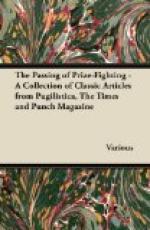Farmer’s Man. “WELL, TO BE SURE, SIR, WE’D LOST OUR ONE-POUND WEIGHT; BUT WE TOOK ONE OF YOUR POUND PACKETS OF TEA TO WEIGH IT WITH.”]
* * * * *
THE PECULIAR CASE OF TOLLER.
Toller first floated into public notice on the fame of Rodman, who by an irony of fate is now all but forgotten. Rodman, it may be remembered, was a promising young poet during the first decade of this century. Out of a scandalous youth whose verses made their appearance in slim periodicals that expired before their periodicity could be computed, he was evolving into a reputable poet who was given a prominent position facing advertising matter in the heavy magazines when he met with his regrettably early end. Apart from his poems he left no literary remains, except a few letters too hideously ungrammatical for publication. The sole materials for a biography lay in the memory of Toller, who by a stroke of luck happened to have known him intimately.
By an equal piece of good fortune Toller had taken a course of mind training and his memory was exceptionally retentive. His Life of Rodman achieved instant success, a far greater than Rodman’s Collected Works. The undomesticities of a poet’s life naturally excite greater interest in the cultured than his utterances on Love, Destiny and other topics on which poets are apt to discourse. Toller, until then a struggling journalist, became all at once a minor literary celebrity, much in demand at conversaziones and places where they chatter. Sympathy for Rodman aroused curiosity which only Toller could satisfy.
His memory, continually stimulated by questions, gained further in strength. The more he was asked the more he remembered, and so on in a virtuous circle. His Rodmaniana provided him with a comfortable income. He removed from Earl’s Court to luxurious chambers off Jermyn Street, from which he poured out article after article on the deceased poet.
Then suddenly, without warning, probably from overstrain, his memory gave way. Everything in the past, Rodman included, vanished from his mind. A greater calamity one could not conceive. It was as though a violinist had lost a hand, a popular preacher his voice. His livelihood was gone. Much as his babble about Rodman had bored me I could not but feel some sorrow for him, fallen from his little pinnacle of fame and affluence. Judge, then, of my surprise when I passed him about a fortnight ago faultlessly dressed and wearing an air of great prosperity. He showed of course not the smallest recollection of me.
“How does Toller manage to live?” I asked Cardew, who knows him better than I do.
“He still writes,” was the reply.
“What—without a memory?”
“Yes, he finds it an advantage. You see, since the fusion of the old parties and the formation of new ones, the possession of a memory is often a source of considerable embarrassment to a leader writer. Toller now does the political articles for a prominent morning paper. The proprietors consider him a wonderful find.”




